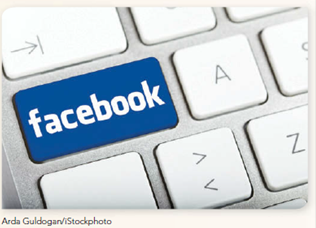
Management 13th Edition by John Schermerhorn,Daniel Bachrach
Edition 13ISBN: 978-1118841518
Management 13th Edition by John Schermerhorn,Daniel Bachrach
Edition 13ISBN: 978-1118841518 Exercise 22
KNOW RIGHT FROM WRONG
Since when is someone's Facebook profile meant to be an online résumé
Personality Test Drug Test Social Media Test

I t used to be that preparing for a job interview meant being ready to answer questions about your education, work experience, interests, and activities. Now there's another question to prepare for: What's your Instagram user name and password
Believe it or not, it's true. Many interviewers are now asking for access to an applicants' social media pages. They don't want just a quick glance at the public profile; they want access to the private profile, too. It's time to get worried when the recruiter says, "Please friend me."
"It's akin to requiring someone's house keys," says a law professor. One job candidate turned over a password because "I needed the job to feed my family. I had to." Another refused the interviewer's request and withdrew her application. She didn't want to work for an employer that would even ask to view her private Web pages.
A survey by Microsoft Research found 70% of recruiters saying that they had rejected applicants based on information they found online. Although a social media profile can be a treasure chest of information for recruiters and employers, it is less clear whether it is ethical to tap this resource to measure candidates' characters and make employment decisions. Since when is a Facebook profile meant to be an online résumé
Sometimes recruiters make negative hiring decisions after finding relatively mild forms of questionable behavior such as using poor grammar, posting negative comments about prior employers, or uploading drinking pictures. This may be information or pictures that the individual has little control over. What happens if a "friend" posts a picture of someone from a party from years ago, or if inaccurate or untrue information is posted as a joke among friends
WHAT DO YOU THINK
What are the ethical issues involved with regard to recruiters asking for access to personal Facebook-or other online social network-pages Should it be held against applicants if they refuse Is it okay for managers to search online sites to check up on what employees are doing outside of work Should what someone does outside of work cost them their job On the other hand, shouldn't individuals who knowingly post online information understand that it may end up in the hands of their employers Where do the lines of responsibility fall
Since when is someone's Facebook profile meant to be an online résumé
Personality Test Drug Test Social Media Test

I t used to be that preparing for a job interview meant being ready to answer questions about your education, work experience, interests, and activities. Now there's another question to prepare for: What's your Instagram user name and password
Believe it or not, it's true. Many interviewers are now asking for access to an applicants' social media pages. They don't want just a quick glance at the public profile; they want access to the private profile, too. It's time to get worried when the recruiter says, "Please friend me."
"It's akin to requiring someone's house keys," says a law professor. One job candidate turned over a password because "I needed the job to feed my family. I had to." Another refused the interviewer's request and withdrew her application. She didn't want to work for an employer that would even ask to view her private Web pages.
A survey by Microsoft Research found 70% of recruiters saying that they had rejected applicants based on information they found online. Although a social media profile can be a treasure chest of information for recruiters and employers, it is less clear whether it is ethical to tap this resource to measure candidates' characters and make employment decisions. Since when is a Facebook profile meant to be an online résumé
Sometimes recruiters make negative hiring decisions after finding relatively mild forms of questionable behavior such as using poor grammar, posting negative comments about prior employers, or uploading drinking pictures. This may be information or pictures that the individual has little control over. What happens if a "friend" posts a picture of someone from a party from years ago, or if inaccurate or untrue information is posted as a joke among friends
WHAT DO YOU THINK
What are the ethical issues involved with regard to recruiters asking for access to personal Facebook-or other online social network-pages Should it be held against applicants if they refuse Is it okay for managers to search online sites to check up on what employees are doing outside of work Should what someone does outside of work cost them their job On the other hand, shouldn't individuals who knowingly post online information understand that it may end up in the hands of their employers Where do the lines of responsibility fall
Explanation
In the past selection of candidate was d...
Management 13th Edition by John Schermerhorn,Daniel Bachrach
Why don’t you like this exercise?
Other Minimum 8 character and maximum 255 character
Character 255


